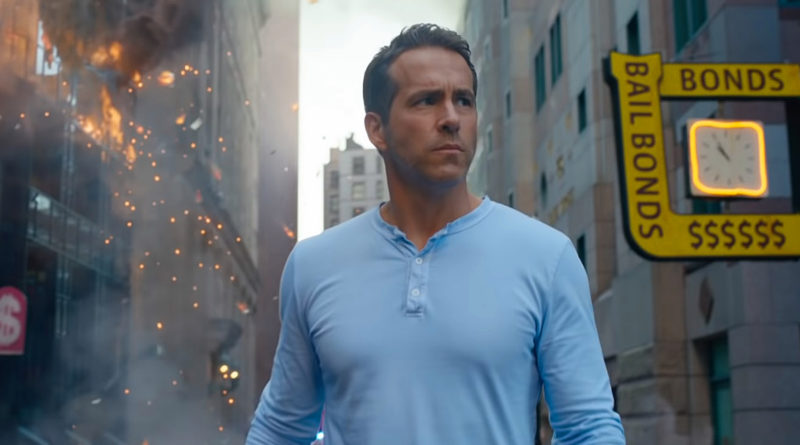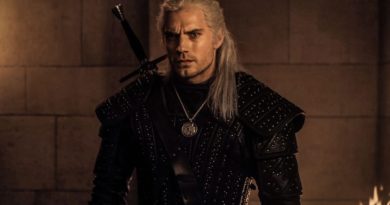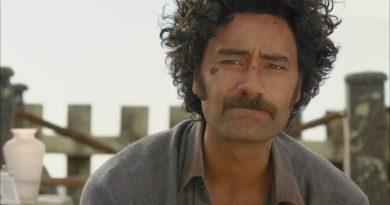‘Free Guy’ Review: Great Concept Held Back By Generic Cliches
Free Guy feels like a movie of two halves. The first half is a movie that has a creative premise – what if a computer non-player character (NPC) creatively named “Guy” since he’s… you know… a guy, one day finds his way out of his programing loop and gets to do what the players (PC’s, or Player Characters) get to do in a Saints Row (yes, not Grand Theft Auto) type game. Why did this happen, and what would he do with this new-found power? It is this premise – a mix between Plato’s The Cave driving toward a revolution to a better life – that is engaging and interesting in the movie.
The other half of the film seems like pretty bland potatoes. We have the bright-eyed, visionary game designer who lost her (creative-yet-semi-boring) game engine (I believe it was the engine? Or was it just the AI? Or does the movie even care about delineating these two things?) trying to prove that her code was, in fact, stolen by the Tech CEO-as-God (Taika Waititi) and her extremely boring programing partner (you know, the guy who wrote the code) who awkwardly pines after her even though she doesn’t notice his affections nor have feelings of her own for him. The resolutions play out in the way you would expect – the programming friend starts by not believing the code is being used, then realizes it is, while all the time helping out our main character who is trying to prove her code is actually in the game.
When I say the corporate part of this movie weighs down the film, I am not kidding. The most interesting things – NPC’s trying to live a semblance of a normal, if very rote, life and one of the NPCs breaking out of it is a fun idea. It may seem like it leans too heavily on The Matrix in regards to what the character arc should be, but it works much better as more of an everyman story – there is nothing special about Guy aside from the fact that his “motivation” (seeing the girl of his dreams, of course) was fulfilled, and this causes him to break free from the confines of his everyday existence. Yet the film decides to truncate the “learning how to operate in the world” advancement of Guy in favor of corporate espionage. All the progress Guy wanders across happens in montage that will be fun for fans of videogame streamers but make the rest of the world scratch their heads. Unlike Edge of Tomorrow, which keenly balanced the development of the main protagonist from useless soldier to nigh-superhero status, Free Guy just basically says “Guy is now at the right level and is great at everything”.
Again, the film gets interesting when the real world notices that Guy’s actions are more like a good guy – saving the NPCs from the player characters that mindlessly go around, complete missions, and kill everyone in-game. This, again, is a cool concept – the idea of someone in an open-world sandbox game where you can choose to save the NPCs that you care about, given more weight because you live in that world. You even start to care about the NPCs, each one given a few interesting traits that make them easily recognizable.
Yet even then, it’s squandered by focusing on the real-world humans. And again, maybe it’s just me, but I really didn’t like the programmer character. He was fairly boring and, with a bit of better writing, could probably have been eliminated in the movie altogether (yes, this would have meant that Guy’s motivation would have had to change, but I think it would have made the finished film much better). The CEO character is a pretty good villain, balancing quirky and evil, but he also feels very underdeveloped and empty, more a caricature than an actual character.
I also think this will be a hotly contested take, but as good as Ryan Reynolds is in the move, I felt like he was somewhat miscast. The role of Guy needs to be sincere in a way Ryan Reynolds strains to be – behind every line there’s a bit of a sarcastic bite that makes the character feel less authentic than he should be. I can’t believe I’m writing this, but Guy would have been a perfect part for Chris Pratt (though he probably would have seen the role as too similar to The Lego Movie). I understand that Ryan Reynolds is a producer on the film, and the movie would not have been made (or even been successful) without his name attached. It just felt like a glove that didn’t quite fit right.
The rest of the cast does its job. Jodie Comer does a good job as the idealistic yet defeated game designer, Taika Waititi is good enough as the CEO (if more annoying than anything). As usual, Lil Rel Howery is the best in the movie, bringing likeability and genuine compassion to really make you believe in Guy and Buddy’s relationship. Channing Tatum’s cameo is probably the next best thing in the entire film.
As is probably to be expected in every new Ryan Reynolds movie from now till the end of time, the movie is chock full of pop culture references, whether they are appropriate or not. Your mileage as a viewer will vary – I found a handful of them funny, but near the end they were too gratuitously patting themselves on the back in a way that was a bit too obnoxious (there is even a musical sting for one, hitting your nostalgia muscles in just the right spot and topped with a cherry of a cameo that will make you feel like the filmmakers felt they were the most clever people on the planet).
Special props needs to be paid, as usual, to the production design, sound, and music. Christophe Beck continues to be an underutilized talent – his music is pitch perfect. I especially like some of the more electronic-inspired tracks in the film. The production design is also really great – the fact that most of the NPCs live in white rooms that have only a spash of color – designated by the attire the wear – is brilliant. The over-the-top jacket Taika Waititi wears is also brilliant, reflecting how out-of-touch with reality he is. The visual effects artists also sneak in some fun cameos, with my favorite being a guy who constantly jumps into a wall like he’s trying to clip through.
I also need to address the fact that, as a videogame player, the movie feels like a bit of an insult. In much the same way movies that have teachers fail to really replicate the reality of being a teacher in America or understand how school districts work, I feel like a lot of the problems experienced in the movie don’t accurately reflect video games and video game culture. I think the way they explain how the architecture of the main game in the world is built on the foundation of the code that the game design girl and the programmer guy created doesn’t make a whole lot of sense – especially how it is visually represented in the movie. I also feel like it has “Ready Player One” syndrome – the whole world is obsessed with what amounts to one game (though this shouldn’t surprise anyone – one of the scriptwriters worked on the Ready Player One film and brings a bit too much of that to this film).
I also have to say that it is such a depressingly hypocritical movie. One of the side plots is that the CEO is working on creating a sequel to this game, which itself was built on the foundation of code that was stolen from artists who were interested in making a great product and not just a somewhat generic-yet-massively-successful multiplayer game. All of this in a movie that clouds its creative concept with a generic b-plot that makes a ton of money and causes a frivolous sequel to be greenlit. I don’t know – it just makes me feel a bit gross.
Rating: It’s fine.




